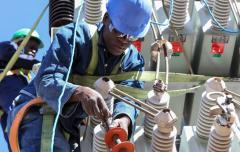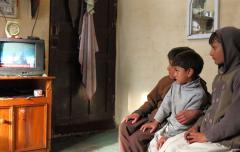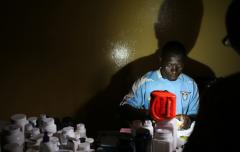Editor's pick: Coronavirus means better work is more vital than ever
New Ashden report shows path to sustainable livelihoods
By Harriet Lamb, Ashden CEO
The coronavirus pandemic will not affect us all equally. Those living in poverty are most in danger. Often, these same communities are most at risk from the climate crisis. By investing in climate action, we create better work for the worst off – work that simultaneously tackles poverty and protects the planet, bringing benefits today and tomorrow.
The world is already full of inspiring examples - from women-led solar microgrids in Yemen, to communities earning a living while replenishing the rainforest. If we recognise what drives their success, we can replicate it and address the biggest global challenges.
Even before the pandemic struck, 731 million people lived with an income below the World Bank’s poverty line of USD 1.90 a day. They are now on the front line of this international health crisis. They are the people with little or no access to clean water and healthcare, and least able to physically distance. The ones forced to walk thousands of miles to their home villages because of collapsing labour markets. The ones without any kind of financial safety net. The same communities are at greatest risk from the climate crisis, which threatens to spark conflict, destroy crops and raise temperatures to lethal levels.
Better work – work that generates a decent income, as well as being safe, stable and dignified – is vital. It is crucial for the entrepreneurs who make up most of the workforce in the world’s poorest countries. Of course, better work is no cure for the world’s problems, and must go hand-in-hand with progress on issues such as gender equality and improved legal rights. But better work can itself drive change in these areas, as these three examples show.
Better work delivers raised incomes – and a fairer world
War has destroyed Yemen’s infrastructure and economy, leaving people struggling to pay medical bills. “COVID-19 is one more worry for people who are already so vulnerable" warns Franz Rauchenstein, head of the Sana’a delegation of the International Committee of the Red Cross. In this unforgiving environment, community-owned solar microgrids are providing reliable incomes and clean energy. A United Nations Development Programme scheme supplied training and an initial grant to the grid owners, but the businesses are now entirely self-sufficient. The grids cut the local cost of electricity by 50 percent or even more, compared to the polluting diesel generators they replace.
One grid is owned and managed by a group of woman entrepreneurs, something extremely rare in rural Yemen. The group have overcome huge challenges to win greater status in their community, changing perceptions and inspiring their neighbours.
The pandemic has underlined the need for resilient societies. For marginalised people, co-operative solutions are a vital route to security – often unlocking finance and investment that would otherwise be out of reach. In the Indian state of Gujarat, salt farmers belonging to the Self-Employed Women’s Association benefit from an 80% subsidy on solar water pumps, as well as credit.
Salt farming is gruelling, low-paid work. The solar pumps are cleaner, more efficient and cheaper to run than polluting diesel alternatives and enable the women to dramatically raise their net income. They have used their collective bargaining power to cut out middlemen they used to trade with, selling their ‘solar salt’ directly to large buyers at more than double the price-per-tonne they used to achieve.
Brazil is one of the countries worst affected by the pandemic, and fears are particularly high for the country’s indigenous people. Threats to these communities affect us all – as their rainforests act as a vital defence against the climate crisis. Research shows forests stewarded by indigenous people offer more climate benefits than those managed by governments and businesses, and this is only possible if we protect those communities’ wellbeing – both their health and their ability to earn a living.
The Xingu Seed Network is a co-operative of seed collectors from indigenous communities in three Amazonian regions. They earn money by selling seeds to landowners who are legally obliged to reforest their land. To date seeds supplied by the network have reforested more than 6,600 hectares of degraded rainforest. The seeds are planted using the Muvuca technique, which involves spreading mixed seed species. This technique makes it possible to plant up to ten times more trees per hectare and at half the cost than the more mainstream method of planting with vast numbers of homogenous seedlings.
Time to back better work
Our new report, Powering Better Work, reveals over a dozen more projects and organisations – from businesses and charities, to co-operatives and community groups – delivering better work through climate action.
We have identified the four key qualities that unite top innovators:
- They take a holistic, people-centred approach with solutions that addresses multiple barriers including access to finance, social inequality and access to training and technology.
- They harness the power of co-operation – either through formal co-operatives, or by unlocking mutual rewards within communities.
- They build resilience.
- They are rooted in the communities they serve – developed and run hand-in-hand with marginalised people.
We call on governments, funders and investors to recognise these qualities as drivers of better work, the kind of work that can help us reach zero poverty and a zero carbon future. Initiatives that embrace them deserve financial backing and policy support. Those in power must act fast – in our dangerous new world, those with the least have the most to lose.
Photo credit: Solshare




